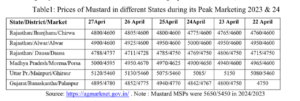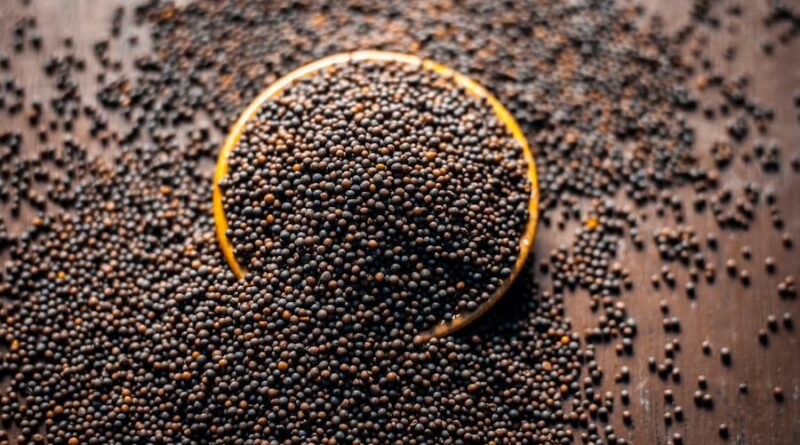Mustard price below MSP may dent self-sufficiency in oilseeds
By Dr. Sher Singh Sangwan
The market prices of mustard during April 22-28, 2024 are hovering around Rs 4800 per quintal in the major producing states of Rajasthan, Madhya Pradesh, and Uttar Pradesh, whereas the Minimum Support Price(MSP) of Rs5650 for 2023-24. The Minister of Agriculture, Government of India (GOI) has announced in February 2024 to procure 28.2 lakh tons of mustard against the expected all India production of 130 lakh tones in this year. Except Haryana and a few districts of Uttar Pradesh, government procurement at MSP has not started. It is to be noted that average mustard market price during April 2023 was around Rs4500 per quintal (MSP, Rs5450), whereas it was as high as Rs6700 per quintal in April 2022. Haryana Government has taken up procurement almost every year; though it used to be only one fourth of production as per GOI policy of Price Support scheme (PSS). As per the pre-conditions of the scheme, pulses and oilseeds shall not be purchased more than 25 quintal per day and the overall procurement is restricted to 25 % of the production of a crop in the state. The GOI has removed the ceiling for pulses of Toor, Urad and Masoor in October 2023, though it is yet to be put into practice. Such proposal is under consideration for major oilseeds too but in February 2024, Agricultural Minister, GOI announced to procure 28.2 lakh tones of mustard at MSP which is just about 22 % of the expected all India mustard production of 130 lakh tonnes. Thanks, Haryana Government is leading in this regard and has purchased around 5.5 lakh tons from 26 March to 15 April 2024 and procurement is continuing against expected production of about 14 lakh tones in the state. But procurement is still there is condition of 25 quintal per day which is troublesome and costing farmers to keep the produce for more days in the market. Added to it, there is pressure from the farmers of neighboring states to sell in Haryana through machiavellian tactics as there is no procurement in those states.
To recapitulate about oilseeds, Mustard is the key oilseed crop that can help in addressing the challenge of demand – supply gap of edible oils in India. It is world’s third most important source of edible oil after soybean and palm. India is the third largest producer of rapeseed-mustard after Canada, China and contributing to around 12 % of world’s total production. Of the total area and production under the nine oilseeds crops grown in India, rapeseed-mustard accounts for about 27% of the acreage and 35% of the production with about 80% of share of mustard in the two crops. Although rapeseed-mustard is cultivated in most of the states, but the major producing states are Rajasthan (47.5 %), Haryana (12.5 %), Madhya Pradesh (11.3%), Uttar Pradesh (10.6 %), and West Bengal (7.5 %). The remaining about 12 % is contributed by Assam, Gujarat and other states. Except Haryana, the market prices in main producing states including Gujarat are 700-800 below the MSP during April 22 to 27, 2024(Table-1).

Implication of not defending MSP
Firstly, it is well established that farmers allocate area under a crop in view of its last year price, ceteris paribas. Hence, MSPs for mustard and other crops are announced by GOI before their sowing season to motivate farmers in area allocation under different crops. The mustard in Haryana has almost been procurement every year at MSP and hence, the increase in area allocated under crop has been higher in the State than most of the other states.
Secondly, high income expectations for the farmers are created by GOI by announcing higher MSP of mustard and other crops. But when these expectations are not realized by the farmers in the absence of procurement at MSP than their anguish in ignited instead of goodwill for the Governments of the state and Centre. I have observed the resentment among farmers in Rajasthan when they get about Rs1000 below the price realized realized by farmers in Haryana for mustard and bajra. Hence, the ruling parties at state /centre should defend the announced MSPs in their own political interest too.
Thirdly, the pseudo higher MSP of mustard without procurement will not be instrumental in inducing more acreage under the crop in the country as a whole and it will defeat the goal of achieving self sufficiency in oilseeds. To reduce our huge import bill of edible oils/oilseeds which was about Rs140000 in 2023, GOI must defend the announced MSP like wheat and paddy. Moreover, import substitution of edible oils will be easier than exporting surplus wheat and paddy.
Fourthly, the bias in the price procurement policy of wheat & paddy by FCI and oilseeds & pulses by NAFED under PSS may be removed. The NAFED should also purchase mustard and other oilseeds without the restrictions of overall 25% procurement in total production and per day sale of 25 quintal by a farmer. The author has also harped upon the 100 percent procurement of oilseeds and pulses at their MSP in his earlier publication in the Tribune (January 2021& others). Thanks, GOI has announced in October 2023 the removal of quantitative restrictions on procurement of pulses such as toor, urad and masoor under the PSS. It is high time; the GOI may also remove the quantitative restrictions for major oilseeds like rapeseed & mustard, groundnut, soybean, and sunflower. Then, the higher realized MSPs will certainly induce farmers to allocate more acreage under oilseeds from irrigated crops like wheat in Rabi season and course cereals in Kharif season for achieving the India’s goal of their self sufficiency in edible oils.
This article has been republished from The Times of India.

